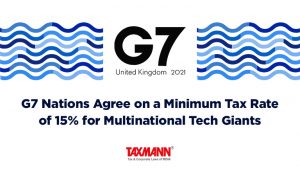G7 Nations Agree on a Minimum Tax Rate of 15% for Multinational Tech Giants
- News|Blog|International Tax|
- 2 Min Read
- By Taxmann
- |
- Last Updated on 15 December, 2025
The Finance Ministers and Central Bank Governors of the G7 met virtually on 28 May 2021, and Finance Ministers met in London on 4-5 June 2021. They were also joined by the Heads of the International Monetary Fund (IMF), World Bank Group, OECD, Eurogroup, and Financial Stability Board (FSB). The group agreed to take concrete actions to address historical challenges and make an effort towards deeper multilateral economic cooperation.

The group announced its commitment to build a strong, sustainable, balanced, and inclusive global economic recovery, tackle climate change, support low-Income, and vulnerable countries, and shape a safe and prosperous future for all. Working towards shaping a safe and prosperous future, the group reiterated its support to the efforts underway through the G20/OECD Inclusive Framework to address the tax challenges arising from globalization and the digitalization of the economy and to adopt a global minimum tax. G7 Nations committed to a global minimum tax of at least 15% on a country-by-country basis.
Following years of discussions, the G7 Finance Ministers have agreed to reforms that will see multinational tech giants pay their fair share of tax in the countries where they do business. The G7 has agreed to a global minimum rate principle that ensures multinationals pay a tax of at least 15% in each country they operate.
The G7 stands for ‘Group of Seven’ industrialized nations. It comprises of US, UK, Germany, France, Canada, Italy, and Japan. More than four decades ago, the group was created as an annual gathering of political leaders to discuss and exchange ideas on various issues, including global economy, security, and energy.
The Finance Ministers of G7 has agreed to the principles of an ambitious two Pillar global solution to tackle the tax challenges arising from an increasingly globalized and digital global economy.
Pillar One
Under Pillar One, the G7 agreed that the largest and most profitable multinationals would be required to pay tax in the countries where they operate and not just where they have their headquarters. The rules would apply to global firms with at least a 10% profit margin – and would see 20% of any profit above the 10% margin reallocated and then subjected to tax in the countries they operate.
Pillar Two
Under Pillar Two, the G7 also agreed to the principle of at least 15% global minimum corporation tax operated on a country-by-country basis. It will create a more level playing field and cracking down on tax avoidance
Discussions on the two Pillars have been ongoing for many years – with the Chancellor making securing a global agreement a key priority of the UK’s G7 Presidency. The agreement will now be discussed in further detail at the G20 Financial Ministers & Central Bank Governors meeting in July 2021.
Disclaimer: The content/information published on the website is only for general information of the user and shall not be construed as legal advice. While the Taxmann has exercised reasonable efforts to ensure the veracity of information/content published, Taxmann shall be under no liability in any manner whatsoever for incorrect information, if any.

Taxmann Publications has a dedicated in-house Research & Editorial Team. This team consists of a team of Chartered Accountants, Company Secretaries, and Lawyers. This team works under the guidance and supervision of editor-in-chief Mr Rakesh Bhargava.
The Research and Editorial Team is responsible for developing reliable and accurate content for the readers. The team follows the six-sigma approach to achieve the benchmark of zero error in its publications and research platforms. The team ensures that the following publication guidelines are thoroughly followed while developing the content:
- The statutory material is obtained only from the authorized and reliable sources
- All the latest developments in the judicial and legislative fields are covered
- Prepare the analytical write-ups on current, controversial, and important issues to help the readers to understand the concept and its implications
- Every content published by Taxmann is complete, accurate and lucid
- All evidence-based statements are supported with proper reference to Section, Circular No., Notification No. or citations
- The golden rules of grammar, style and consistency are thoroughly followed
- Font and size that’s easy to read and remain consistent across all imprint and digital publications are applied



 CA | CS | CMA
CA | CS | CMA

The spike in consumer prices that left inflation at a four-decade high of 6.8% in November prompted the Federal Reserve to dramatically shift its approach as it eyes earlier and faster interest rate hikes.